Two years ago, I watched and wrote about every single film in the Marvel Cinematic Universe. They've made so many more of them since then! So, now I'm watching all of the newer ones before Endgame gets here.
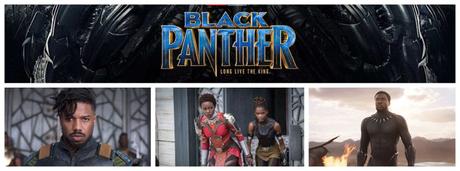
With the exception of films like Iron Man 2 and The Incredible Hulk, there are few MCU films I dislike. I have my favorites that I've watched a lot and those I watch when I've watched my favorites too many times, but I'm fine with having a complete MCU in my Blu-ray library. Having said that, I'm aware the films don't really take major risks. They have a template and they cannot stray too far from that basic path. At least that's what I thought before I saw Ryan Coogler's Black Panther.
Black Panther grinds the MCU roadmap to rubble. Director Ryan Coogler felt like an odd choice to be given the reigns of Marvel's latest tent pole franchise, but just as he did with Creed and the Rocky franchise, he created a film that felt both of a piece with what came before and also completely and utterly unique. It's a superhero film about isolationist tendencies versus providing aid, a film about political debate coupled with a James Bond sense of globetrotting and high-tech gadgetry. There's something remarkably political and revolutionary about a group of African characters taking a wounded American agent back to Africa because that's where the technology most likely to save his life is.
Black Panther gives us the fictional world of Wakanda that blends the primitive and the futuristic into a cohesive existence. This is a world in which monarchy can be challenged by spear and fist brawl while also housing the most advanced weaponry in existence.
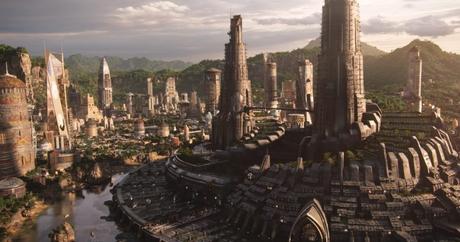
One thing that's remarkable about Black Panther is how unapologetic it is mainstreaming Afrofuturism and defying the white, male hero ideal. All of its primary characters speak with a slight African accent, with a marvelous lack of regard for a mainstream audience's willingness to accept it. The narrative is well into motion before we even see a Caucasian character. That shouldn't be a big deal. After Black Panther, maybe it won't be anymore. Coogler created a film with an immense mainstream appeal not by ignoring the film's racial identity but by embracing it whole-heartedly.
There exists an argument that comic book heroes function as modern day mythology, in which larger than life characters face epic battles and provide guidance as to the kind of people we should choose to be. Black Panther takes that one step farther by actually using Wakandan history and the discovery of Vibranium as a kind of creation myth. The Black Panther isn't merely a superhero - it's a birthright passed down from one Wakandan ruler to the next.
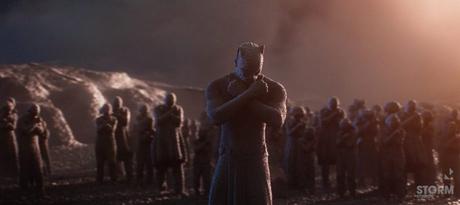
That line of inheritance distinguishes the Black Panther from other Marvel staples. Steve Rogers makes the choice to be Captain America. Tony Stark chooses to be Iron Man. The Hulk and Spider-Man had that choice made for them through outside circumstances, but T'Challa's choices are different. All of those other superheroes use their hero identities to become the people they want to be without preconceived notions as to who they should be.
Contrary to that, there already exists a perception as to who the Black Panther is before T'Challa takes on the mantle. He has to make his own path by breaking away from the past version of the entity, rather than simply becoming an improved version of self. More than any other Marvel film, Black Panther presents characters forced to admit the mistakes of the past and work for a better future.
The screenplay, written by Coogler and Joe Robert Cole, manages to craft a story that both focuses on familial injustice, political debate, and expertly crafted action sequences, all while managing to keep a witty, playful sense of humor that doesn't upset the balance. The characters are three-dimensional and fully realized, giving the film's climactic battle even more than expected emotional stakes. The fact that the fight sequences - both epic and intimate - are amongst Marvel's most expertly crafted doesn't hurt either. The sense of place is never lost in any of them, and they're all remarkable flashy yet following the action is never difficult.
Of course, everything else serves as well-crafted window dressing without the right cast to bring the film to life, and it's here that Coogler's film excels. As the film's red-herring villain, Andy Serkis is having almost too much fun. Klaue almost functions as a villainous counterpart to Janet Leigh in Psycho. You assume he'll be the primary threat until the second that he's not. He chews the scenery in a way that could feel distracting and disconnected from the rest of the film's tone.
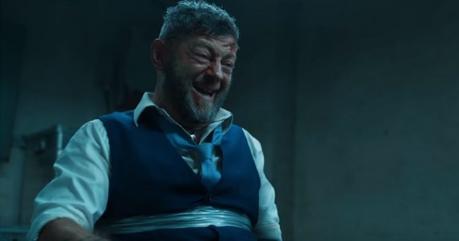
However, Coogler and Cole's script makes the smart choice to dispense with him before he can pull too much focus, finally revealing Michael B. Jordan's Killmonger to be the primary antagonist.
I don't know what I can add to the Killmonger discussion that hasn't already been said. I can probably only echo previous assertions, but Michael B. Jordan's charismatic, angry yet sympathetic characterization finally gives the MCU a worthy villain with a persuasive argument to make about what Wakanda owes him. He's a character who's simply too ruthless in questing for what he feels he's owed, but his argument and list of grievances is sympathetic.
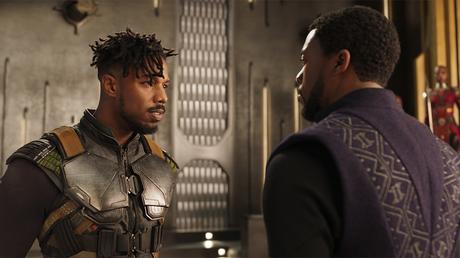
He's a man who discovered his uncle, the former Wakandan King T'Chaka, murdered his father, N'Jobu (the impossibly emotive Sterling K. Brown) because he wanted to assist those in other parts of the world who suffer in poverty, and left him behind in inner-city America to preserve the lie that N'Jobu had simply disappeared. When he dies, choosing to die free rather than live in chains, it doesn't feel like some great moment in which evil is defeated, but instead a solemn, tragic loss.
Killmonger is a victim of circumstances beyond his control and might have been a fine king if not for T'Chaka's actions. His death has to happen, but it feels not like a victory but a necessary action to push Wakanda's destiny forward. If Black Panther has a theme it's about the disastrous consequences of maintaining the status quo and preserving a lie. That's a theme Killmonger's narrative embodies.
Beyond its antagonists, Black Panther is an ensemble in a way few non- Avengers Marvel films ever get to be. Chadwick Boseman is effortlessly charismatic and imbues T'Challa with a sense of regality while remaining completely sympathetic.
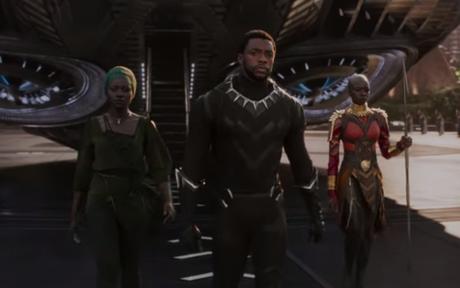
He makes T'Challa's character arc, from isolationist to globalist, completely believable and emotionally resonant. He makes mistakes but learns them and ends the film worthy of the identity bestowed upon him. He's a worthy aspirational character for younger kids to get behind.
However, he's not the sole protagonist. He surrounds himself with strong, intelligent, capable women who give young girls characters to which they can aspire. Whether it's Lupita Nyong'o's Nakia, who tosses romance aside to be an undercover spy who fights for enslaved women, Danai Gurira's Okoye, a strong, capable fighter who saves T'Challa on multiple occasions, or Letitia Wright's Shuri, T'Challa's bubbly, hyper-intelligent, scientist, younger sister, it's a film in which the women are perhaps even more capable than the men who surround them.
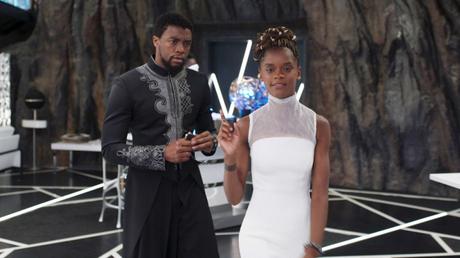
I remember seeing Black Panther opening weekend, with a more ethnically diverse audience than I'd ever seen at a Marvel film, thrilled in the same way I was when I watched the "No Man's Land" scene in Wonder Woman: they finally had a cinematic superhero with whom they could identify.
Beyond this empowering bit of representation, Black Panther immediately stood out as an obvious game-changer from a simple storytelling point of view. I was reminded of how I felt after taking in Logan the year before: that I was seeing someone doing something truly revelatory with a well-worn genre, demonstrating that the only limitations to a film's artistry are the capabilities of those who craft it.
Black Panther managed to finally do what Dark Knight and Logan before it had been unable to accomplish: it broke the Oscar barrier and received a Best Picture nomination. The fact that it lost to a far safer, less challenging film about race feels like a massive injustice but no matter. Black Panther demonstrates how brilliant a Marvel film could be and how unapologetically political it could be. When the film references building bridges instead of walls, it feels like a rallying cry against our current political landscape and lets the viewer relish in every revelatory moment they've seen onscreen. I don't know what else to say except the film is a masterpiece.

Oh you know, I'm just your typical wallflower, high school theatre nerd who minored in film studies, attained her M.A. in English Literature,works as a substitute teacher, and decided to go to nursing school, but really wants to be a writer who blogs about pop culture, and then have people who. . .wait for it. . .actually read/ look forward to what she writes. In my spare time (when it's there), I watch one of my many blu-rays or DVDs (about 800 now), reading my kindle (one of the greatest inventions ever), playing my ipod (another one of the greatest inventions ever), obsess over b=Broadway musicals and horror films, and play my guitar (badly). In other words, I have no life that doesn't revolve aroung pop culture or school. Sigh. View all posts by Julianne Ramsey

